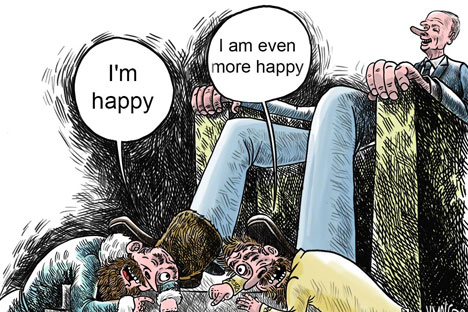
Click to enlarge the image. Drawing by Konstantin Maler
There are various, culture-to-culture political consciousness types that exist. In Russia, a specific type has emerged historically. It is three-dimensional – boyars, folks, and tsar. The matter is not in medieval tsars and boyars, naturally, but in antitypes, images time-honoured in public consciousness. Relations of folks and boyars have always been conflicting. Folks hated betrayers-boyars; boyars despised folks.
The struggle between such two parties of Russian history was for the tsar. Tsars could be boyarish and popular. But most often, the tsar's course was balanced. If a tsar turned his coat to folks, he was characterized as a tyrant by boyars. But if the sovereign took up the boyars' station, he was deprived of legitimacy in folk perception, estimated as an usurper.
Let's now look at President Vladimir Putin's popularity rating through the lens of such antitypes. There is no doubt that his policy perception by folks is to a greater extent built on the basis of traditional Russian power mythology, than of pragmatic calculations of households' budget increase or decrease.
Judging by the recent results of a Levada Center poll, the index of Putin's activity approval remains rather high at 29 percent (64 percent of respondents approved of Putin's activity, 35 percent did not). However, following the maximum of 70.7 percent reached in 2008, it trended to decrease during five years. The first short-term downfall was fixed in 2005. It was in all likelihood connected with benefits monetization reform then implemented.
Putin's activity approval index dynamics and real population income growth dynamics reveals that there is no connection between them. The most significant growth in Putin's activity approval in percentage to the previous year was fixed in 2006 – 133.1 percent. The greatest drop was in 2011 – 66.5 percent. Meanwhile, the highest economy growth rates were in 2007, and the lowest in 2009. Material factor unconditionally affects the head of the state perception, but it is not predetermined.
Comparing Putin's activity approval index with state of the country evaluation index is representative. Given a higher folks-to-president confidentiality extent, the general state of the country is assessed with bitter criticism thereby. According to Levada Center data, the state of the country evaluation index is currently below zero – minus 3. The majority of Russians deem that the country has taken a wrong way, but trusts the president. A paradox! It may be only explained by accepting a traditional Russian model of differentiation between the head of the state and commanding elite images. Historically, folks blamed boyars, rather than Father the Tsar. Moreover, a myth emerged that the tsar would one day eradicate the entire boyar sedition. In accordance with such archetypes, the president's activity approval rating rests first on goodwill.
It's important for the head of the state in essence to comply with the national political ritual. Should such compliance exist, then the trust in the supreme state power holder is ensured. But as soon as the head of the state drops from such ritual, he would lose his legitimacy and acquire the "usurper's" mask.
Putin manages so far to keep the sovereign political ritual line. But judging by change in the president trust index, a principle request exists, however, for more active presidential power manifestations.
Vardan Bagdasaryan is Deputy Director of Center for Scientific Political Thought and Ideology.
All rights reserved by Rossiyskaya Gazeta.
Subscribe
to our newsletter!
Get the week's best stories straight to your inbox